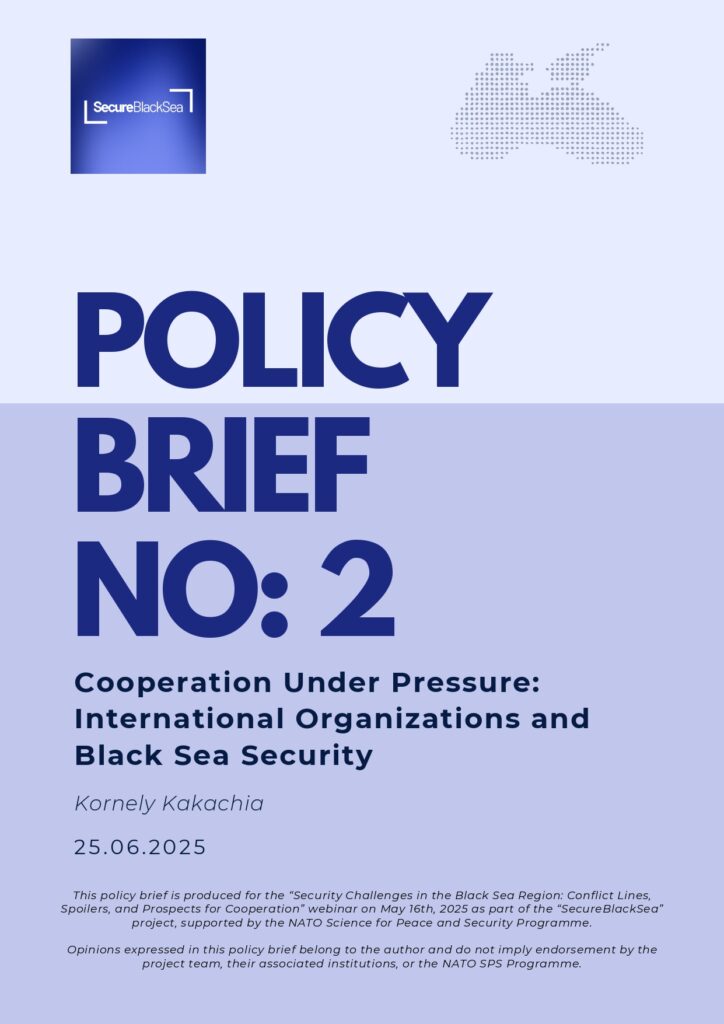Author: Kornely Kakachia, Professor of Political Science and Jean Monnet Chair at Ivane Javakhishvili Tbilisi State University. Director, Georgian Institute of Politics (GIP).
This policy brief was originally published for the “Security Challenges n the Black Sea Region: Conflict Lines, Spoilers, and Prospects for Cooperation” webinar on May 16th, 2025 as part of the “SecureBlackSea” project, supported by the NATO Science for Peace and Security Programme.
Introduction
In an increasingly fragile security and political environment, the Black Sea has emerged as a critical geostrategic hub for the West, owing to its role as a connective corridor between Europe, Central Asia, and the Middle East. The region’s significance is further heightened by the persistent political volatility within several of its littoral and adjacent states, manifested through ongoing armed conflicts, unresolved territorial disputes, hybrid threats, democratic backsliding, and growing authoritarian entanglements. These dynamics contribute to regional instability and generate profound uncertainties for international actors such as NATO, the EU, the Organization for Security and Cooperation in Europe (OSCE), and the Black Sea Economic Cooperation Organization (BSEC), all of which maintain economic and security interests in the wider area. Since the end of the Cold War, the Black Sea has witnessed the densest concentration of military confrontations in Europe, culminating in the ongoing Russia-Ukraine war (Hess 2022).
The Black Sea region holds profound geopolitical, economic, and strategic importance for regional and global actors. Its location makes it a vital transit zone for energy, trade, and military movements. As a maritime multiplier corridor, it offers the shortest route for connecting the landlocked Security challenges to the countries of the Black Sea basin, including NATO members and EU states. Hence, the Black Sea has become a new frontline in geopolitical competition between Russia and the West. Simultaneously, the region holds significant economic and strategic value, offering Europe potential access to Central Asian energy resources and broader Asian markets.
Moreover, Russia’s military dominance and China’s expanding economic presence in the Black Sea challenge Europe’s security and undermine economic and energy stability, particularly amid efforts to reduce dependence on China and severed ties with Russia. In this context, the Black Sea has several vital functions in Russian maritime strategy. In particular, it is the world’s second-largest oil exporter, with “22% [of] shipments coming through Black Sea loading points like the Novorossiysk Commercial Sea Port” (Black and Kaushal 2025). Apart from this, Russia also has agriculture and fertilizer export interests, to facilitate export through the Black Sea, increase its role in the market, and consequently to cut Ukraine from the global market and undermine Ukraine’s not only food export ability but its economic sustainability as well.
Moreover, the Black Sea is a key arena where the strategic ambitions of Türkiye and Russia intersect—sometimes in cooperation, often in competition. Both countries view the region as a sphere of influence, essential to their national security, economic ambitions, and geopolitical status. Cooperation with Türkiye is crucial for Russia in this process due to its monopoly on overseeing the “access to the Mediterranean through the Bosporus Straits”, and it is a NATO country (Mester 2025). However, the relationship with Türkiye is not simple due to their continuous strategic contestations in different regions, including the South Caucasus (de Waal 2025).
As a result, Europe is rethinking its security architecture, one of the parts of which is the Black Sea. However, the efforts might be ineffective in the fragmented and uncoordinated approaches of the EU, NATO, and other regional organizations. Such a complicated geopolitical environment needs a new multidimensional approach from state and non-state actors to maintain regional sustainability (Delcour and Wolczuk 2015). To reach that goal, there is a need for coordination and cooperation of states of the wider Black Sea region and international actors to optimize their engagement in the region, which is not easy due to their different objectives and visions.

